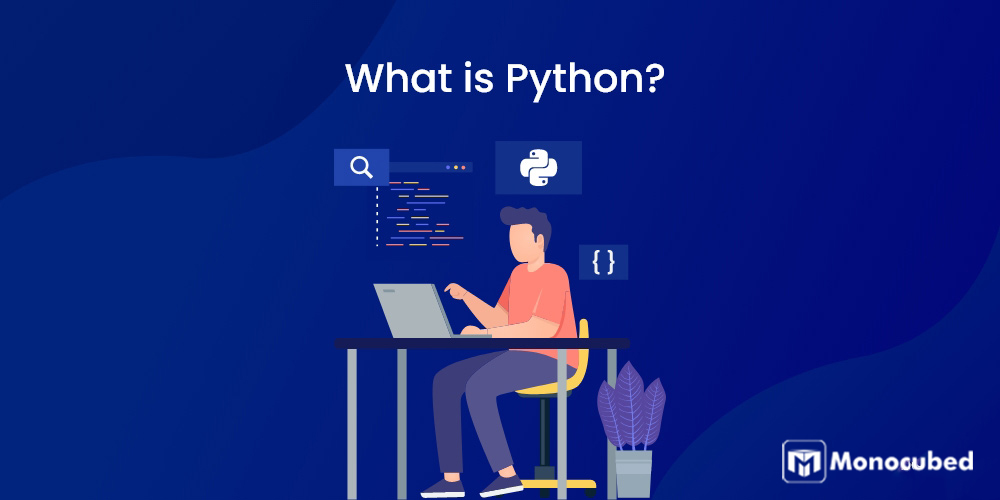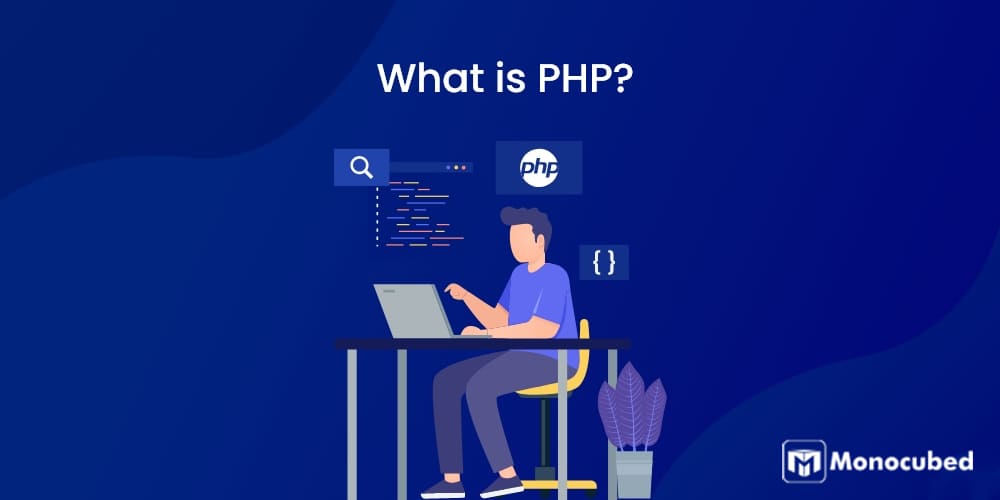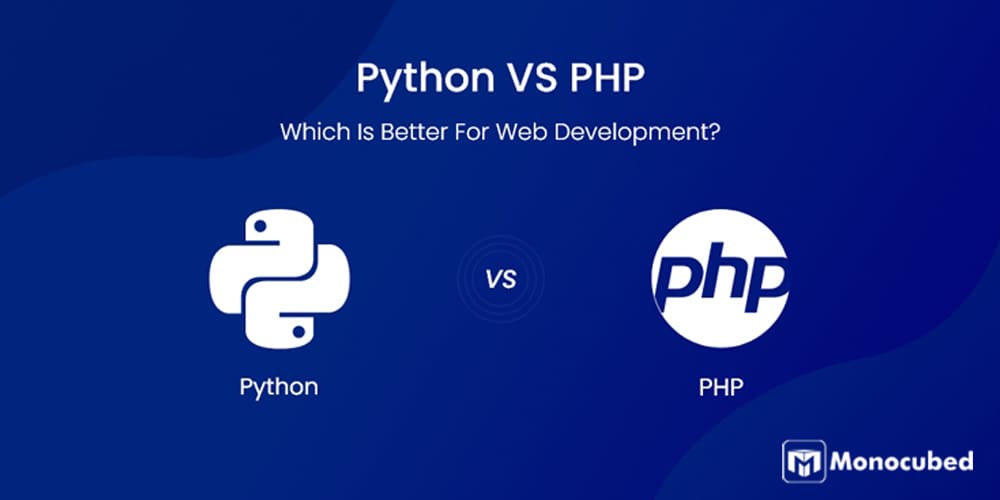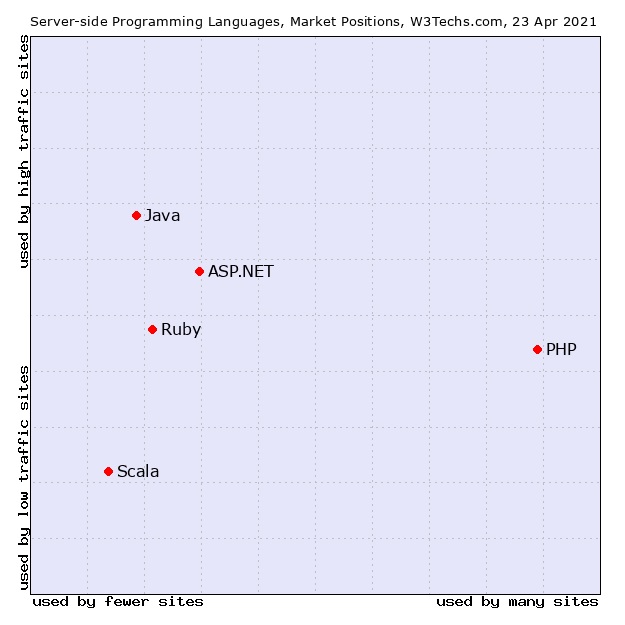Choosing the right programming language is essential for a development project. Python and PHP are the leading choices for backend developers today. But which language is right for your project – PHP or Python? What is Python used for? When to choose PHP? Is PHP faster than Python?
Well, not to worry, we are here with all the answers- a Python VS PHP battle. In this article, we bring to you all the major differences between both languages so that you can decide once and for all which is the superior language. But first, let’s have a small introduction to PHP and Python.
Table of Content
An Introduction: What is Python?
Python is an open-source general purpose programming language that focuses on object-oriented programming concepts. It is one of the most widely used languages today, offering easy-to-understand high-level syntax. The guiding principles of Python are to ‘simplify all that we can’, and ‘simple is better than complex.’ It is one of the most loved and wanted languages according to this Stack Overflow survey 2020.

Developed in 1991 by Guido Van Rossum, it is a top choice for projects involving the development of software, be it product development or application development. Multiple organizations around the globe trust Python with their applications.
An object-oriented programming language like Python provides building blocks to you in terms of objects and classes. It also employs functional, procedural and aspect-oriented programming paradigms. Python works as a scripting language for web browsers and you can use it for developing web applications. With JavaScript vs Python, we compare Python with the most popular web language to see if Python can surpass JavaScript.
Its smooth learning curve and performance make it apt for quick prototyping and quick updates. Many new evolving technologies such as data science, machine learning, and artificial intelligence also find Python to be a very supportive and flexible language owing to the robust inbuilt library it offers.
Stable Version – Python 3.9.2
The latest stable version of Python was released on 19th February 2021. Python 3.9.2 was released with a lot of new functionalities. Some of the new features and updates included in the version are-
- A new module called the zoneinfo available in the standard library, with which you will be able to easily handle and work with time zones.
- The new version of Python introduces two new operators the union (|) and the in-place union (|=) operator for manipulating dictionaries.
- One of the coolest features of Python 3.9 is the new and improved parser. In the latest version, the program can run on two parsers- LL(1) and PEG parsers. The results from both can be compared at the AST level.
- os.pidfd_open() is a new function added to the latest version. This function allows process management without requiring races and signals.
Features
Other than the latest features of the new and improved version of Python, there are way too many features offered by the language for developers like you. Some exceptional properties of Python that make it so widely beloved are-
- Modules – Rather than having everything built into its core, Python was designed to be highly extensible with modules. Modules are basically data stores that can hold definitions and variables which can be used in Python script.
- Standard Libraries in Python enable quick development of websites and robust apps by offering a large variety of modules.
- The Python Package Index (PyPI), the official repository for third-party Python software, contains over 290K packages with a wide range of functionality.
- Extensive external libraries are one other outstanding feature of Python. Tensorflow, NumPy, Pandas, and PyTorch are some Python libraries that provide functions for the smooth flow of Python code and can eliminate repetitive coding.
- Cross-platform – Python can be executed on various platforms using the same interface. Python is also supported by various browsers and different operating systems.
- Readability – The main motto of Python is ‘readability is important’. You develop easy-to-read and maintain programs.
- Single source of truth – Python believes in “There should be one— and preferably only one —obvious way to do it.”
- Community support – Has a large community of developers and experts that regularly generate solutions and make contributions to the open-source knowledge base.
Have a Web App Idea?
Confused where to start? Don’t know how much it will cost? Wondering if it will be successful? We’ve got you covered. Let’s talk.
What is PHP?
PHP is the preferred choice of programming language for developers creating websites. An open-source server scripting language that is used for developing user-driven, interactive web pages, are some of the features of PHP. With an incredible collection of libraries, plugins, and add-ons to expand functionalities, and massive community support, PHP is a developer’s choice of language.

Developed by Rasmus Lerdorf in 1995, it was first known as Personal Home Page. Soon it was developed as a full-functioning language, and renamed as PHP- HyperText PreProcessor. With inbuilt library support, database support, and parsers, PHP is a complete server-side language.
Supported by almost all web browsers, PHP is great for the backend development of web apps. There are also a lot of web frameworks available for developers to access ready-to-use modules and functions for common tasks, such as a contact form or a search queries tab or a menu dashboard.
PHP powers almost all the websites on the internet. It is a fast, pragmatic and flexible language, used to manage dynamic content on HTML sites, databases, and session tracking. At Monocubed, we provide PHP development services for building entire sites for eCommerce, fintech, and other corporate giants.
Latest Stable Release – PHP 8.0.3
The latest version of PHP was released on 14th March 2021. It introduced significant new functionalities, some of which are –
- Just-In-Time Compilation – Significant performance boosts, especially for mathematical-type operations will be achieved using the JIL compiler.
- Match Expression – PHP 8 introduced the match expression, which works similarly to a switch case statement but is more compact and faster to use.
- Attributes – Attributes are another great feature added to the latest version, which allows metadata to be added to classes.
- Native Union Types – Validated at runtime, union data types accept values that can be of different types. Support for union types is now available in function signatures so that we won’t have to rely on inline documentation
- Type annotations are directly added to PHP’s C source code. This way, now internal functions, variables, and methods can hold “complete type information in reflection.”
- Inheritance with private methods is available in the latest version of PHP
- Weak maps – A weak map acts as an automatic garbage collection system, holding keys to objects. With the addition of weak maps, there will be substantial performance improvements for cache memory and will also ease the functioning of Object Relational Mappings(ORM).
Features
PHP is a preferred choice of language for web application development. Along with providing web frameworks for quick and straightforward code writing, PHP also offers other remarkable features such as –
- Easy Database integration with popular database interfaces such as SQL, MongoDB, NoSQL
- PHP is a highly performative and time-optimal language
- PHP is faster over low internet speeds also, which is a major plus point for PHP and a considerable difference between other languages.
- Open source and free for use
- A huge community of developers and contributors
- Powerful library support to use various function modules for data representation and manipulation.
- Supports multiple programming paradigms such as functional, imperative, procedural and reflective. It also allows you to implement some object-oriented concepts in programming code.
Python vs PHP – 9 Major Differences
Now that we have a proper understanding of the features and usage of both PHP and Python, we will move forward with the Python VS PHP comparison. We have considered various parameters, such as speed, performance, popularity and more for the comparison between Python and PHP comparison.
-
Speed
Python is well-known for its readability, and unfortunately, slow speeds. The line-by-line execution of Python code by compilers often affects the execution time. The dynamic paradigm that it employs means that there has to be extra work done at execution time and this also has an impact on the overall speed.
But PHP is much better in comparison. The new release including Just-in-time compilers and weak maps has significantly increased the performance speed of PHP-based applications. Even live apps like WordPress are facing a massive boost. For time-intensive web apps, PHP is an obvious contender but for smaller sites, Python works just as well.
-
Frameworks
Both languages offer very reliable and robust web development frameworks. Python has the Flask and Django web framework. PHP, on the other hand, offers many web frameworks and libraries like Zend, Symfony, Laravel, and Codeigniter.
It’s hard to have a Python and PHP comparison for this criterion as both languages have different frameworks for their widely different implementations. These popular frameworks are great for developing modern, fast, and functional apps. But still, if a winner has to be decided, PHP would win just on the basis of the number of options available for you to choose from for development.
-
Debugging and Testing
Python provides an in-built debugger – PDB (Python Debugger) – and also employs several debugging techniques. It is dynamically typed, allowing developers to work freely without declaring objects right at the start of the program.
PHP is no different, offering – XDebug package – to detect bugs and error-check the code for developers. It is found that PHP for web development is considerably slower in finding and removing bugs. PHP also faces a lot of security issues But both programming languages are equally equipped with debugging facilities and thus for this criteria, Python VS PHP has no winner.
-
In-built Libraries
Python has exceptional library support for the development of all types of web applications. The standard library of Python is huge, consisting of functions for almost every common task. Plus, for any more utilities, the Python package manager (pip) provides a platform for easily importing packages from the Python package index (PyPi).
It provides some excellent Machine Learning and Data Science libraries like TensorFlow, Keras, Theano, Scikit Learn, etc. These libraries are fast, pragmatic, easy-to-use and can be quickly integrated with any web development framework.
PHP lags in this aspect compared to Python, but the package repository Packagist is a strong backbone holding PHP. The package management is better for Python and thus in this round of PHP VS Python, Python receives a win.
-
Database Support
Most PHP frameworks are compatible with a number of famous relational databases. Some PHP frameworks further simplify database operations by providing object-relational mapping (ORM) systems.
The programmers can take advantage of the ORM systems to perform CRUD operations without requiring prior SQL programming experience. The ORMs allow programmers to write object code directly in the PHP programming language.
Python is also database-integrable with multiple top relational database language support. But in comparison, PHP is more accessible for database manipulations.
-
Syntax
Python uses the English language for most keywords, employing the ‘write as you read’ philosophy. Its syntax is extremely readable and it uses dynamic typing and explicit definition techniques. Thus as a Python developer, you can easily learn and adapt to the syntax and semantics rules without much hassle.
Unlike PHP, Python uses indentation for more than just readability. Indentation is used to segregate blocks of code, and you will get errors if not indented properly. PHP, on the other hand, uses much more complex rules for syntax and requires using keywords and punctuations in the code. So in terms of code readability and adaptation to syntax, Python is a clear winner.
-
Usage
PHP was developed as a pure scripting language. With subsequent updates, PHP is becoming a more general purpose programming language, but at the end of the day, it is still mainly used in web development. Python on the other hand is used in various domains, ranging from game development, machine learning applications, data analytics tools and of course, web app development.
In usage, Python VS PHP has a clear winner- Python. With its multi-purpose usage, Python language can assist you with all software development needs. It has recently been very popular for backend or server-side development as with Python you can include exciting machine learning features in web applications such as chatbots. -
Popularity
Python and PHP, both have amassed a dedicated community of developers. PHP, being in the market for much longer than Python, has much backing from the web developing community.
Python is also extremely popular and rising in the list of top web development languages. It is a preferred choice for a lot of companies like Google, YouTube, Facebook and more for their website development. For more information, you can read our blog – Companies using Python.
-
Market
Python has a huge market value in today’s technological world. The job market for a Python developer is extremely demanding and competitive. The need for PHP developers in comparison is decreasing day by day. But if we look at the w3teh survey, PHP is still a preferred choice for developing a high traffic website. One reason for this could be that websites developed earlier have not migrated from PHP to other technology and still function on PHP.
Although both are popular in their own aspects, PHP has a higher market share while Python is higher in demand for job opportunities.
Here, we have compared Python and PHP with each other on the basis of several parameters. While PHP emerged as a winner for many, Python was victorious in other criteria, such as community support and Market needs. But the question remains, which is the better choice for you?
Simple, after understanding your website needs, look at the pros and cons of both languages and decide which is the right choice for your project.
Do You Want to Develop A Scalable Web App?
If you require a scalable, high-performing web app for your business, talk to us. Streamline your business processes with our custom solutions.
Pros and Cons Of Using Python and PHP
Python
Python is a high-level programming language that is designed to be simple in implementing and straightforward to use. With many features and functionalities, Python is one of the most popular languages for programmers. But like every other technology, it also has its own problems and issues. Let us look at the pros of using Python and some of the trade-offs of the programming language.
- Easy to use – Python has a very smooth learning curve, straightforward in writing code and easily adaptable
- Libraries such as TensorFlow for math-intensive tasks
- Versatile – General-purpose language used across various fields.
- Automatic garbage collection
- Easy maintenance
- Cross-platform code reusability
- Easily integrable with programming code of other languages like C++ or Java
- GUI applications are developed by Python
- Monolithic for a small and simple website or application.
- To provide simplicity to the developer, Python uses a huge amount of memory
- Slow speeds as compared to other web development languages
- Not great for mobile application development
- Dynamic typing makes error detection tough
PHP
PHP is a fast scripting language that is used for developing the end-to-end infrastructure of web pages. Let’s look at some of the advantages and disadvantages of using PHP –
- Database collection modules supported by PHP
- Flexible for users
- Numerous open-source PHP frameworks for free usage
- Supported by multiple operating data structures and works cross-platform
- Inbuilt SQL support – easily perform database manipulation using SQL
- Support for other database interfaces such as PostgreSQL, NO SQL and more
- It is platform-independent. PHP-based applications support all OS systems such as UNIX, Linux, Windows.
- Can’t modify the core behaviour of PHP
- Lack of Security features and protocols
- Not for large content-based applications
- It employs weak typing, which can cause incorrect data and knowledge to users.
Frequently Asked Questions
Is PHP faster than Python?
Yes. The updates in the latest version of PHP have brought it to new heights in terms of speed performance tests. In most cases, PHP is a faster programming language compared to Python. The core PHP team has introduced various functions to speed up PHP. But speed is not as much of a problem for Python, as most websites do not require that much power. But preferring PHP for time-intensive applications is a good choice.
How is Python different from PHP?
PHP is a server-side scripting language used for developing scripts that run on web browsers. These scripts are basic guidelines for the browser to execute. Python on the other hand is an object-oriented programming language that is used for implementing algorithms and programs by telling the operating systems what to do. While both are used for web development, the difference lies in the use cases.
Which language to use for the backend?
Some common languages used in backend development are Ruby, PHP, Java, .Net, and Python. These programming languages often use libraries and frameworks such as Ruby on Rails and Django to simplify the web application development process. Results from various surveys suggest that Python, Go and JavaScript are some of the most preferred programming languages for the backend.
Conclusion
As we have seen in this article, there are thousands of reasons for industries to use Python and PHP. They are both top programming languages, preferred for web development. Both are a great choice for the backend development of websites.
We, at Monocubed, will help you choose the relevant language and web framework for your project. Our team of experts can provide guided assistance for developing the ideal website or web application for your business. You can read more about Python and PHP, and other development trends by subscribing to our newsletter.
 By Jeel Patel
By Jeel Patel




